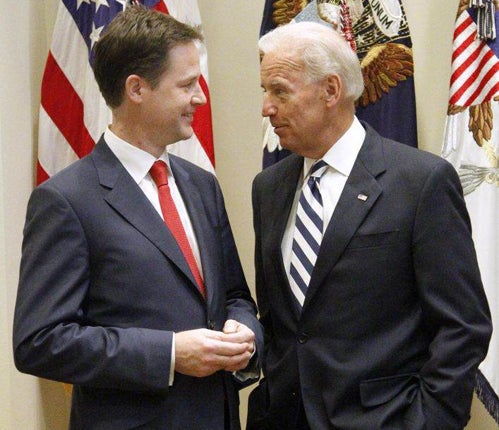Clegg likely to cause surprise with veiled attack on Gulf war

In a gesture likely to startle as much as gratify a wide coalition of world leaders, Nick Clegg, the Deputy Prime Minister, will take the podium at the United Nations today and acknowledge, albeit obliquely and without identifying the country by name, that the invasion of Iraq was misconceived.
Mr Clegg has never hidden his opposition to the Iraq War, but it's a different thing for Britain to own up in such a manner at the home of international diplomacy in New York. His sentiments may not sit well with the Americans.
Mr Clegg, who will be completing his first major foray on the world stage after four days in New York and Washington, will tell delegates that under the Coalition Government, Britain will remain "a beacon of democracy, freedom and law. Many of the values that must be at the heart of a new global settlement are in our national DNA: tolerance, fairness, democracy, and equality before the law".
However, he will go on to set limits to the approach in remarks that will instantly be taken as an allusion to the 2003 invasion. "Our approach will also be hard-headed and realistic," he will say. "We have learned – in some cases the hard way – that democracy cannot be created by diktat. Freedom cannot be commanded into existence."
The Deputy Prime Minister will also spell out the Government's willingness to bring new countries into the UN Security Council with permanent seats that would inevitably dilute the power Britain, with veto rights, has held in New York for 60 years. Among the countries he names are Germany, Brazil, India and Japan.
"The UN Security Council must be reformed to reflect the new geography of power," Mr Clegg will tell the hall. Later he will add: "The UK will always champion the UN. If it did not exist, we would have to invent it. But let me be frank. Without a radical overhaul, the UN will not provide the leadership the world seeks from it, and needs from it."
Originally chosen to head the British delegation to this year's General Assembly and Millennium Goals summit because it seemed for a while that they might overlap with the birth of Mr Cameron's baby, Mr Clegg has so far received a warm reception in New York. In Washington yesterday, he had meetings with US officials including Vice President Joe Biden.
But the tone in his speech today is a departure from those of British leaders who have come before him and certainly from Tony Blair who, in the minds of most other UN leaders, was hitched to George Bush at the hip – though, in fact, London worked harder to resolve diplomatic doubts about the Iraq war than Washington ever did. If multilateralism was the collateral victim of events of 2003, Mr Clegg will stress its importance in future British foreign policy, while arguing that many of the main institutions designed to foster it are showing signs of corrosion.
"The effectiveness of multilateral approaches is in question in the wake of the financial crisis, the collapse of the climate change talks in Copenhagen and the stalling of the Doha trade round.
"Too many nations and international institutions have been too reticent about promoting enlightened, human values. We need to inject new life into our institutions, and new confidence into the expression of our ideals."
Subscribe to Independent Premium to bookmark this article
Want to bookmark your favourite articles and stories to read or reference later? Start your Independent Premium subscription today.

Join our commenting forum
Join thought-provoking conversations, follow other Independent readers and see their replies